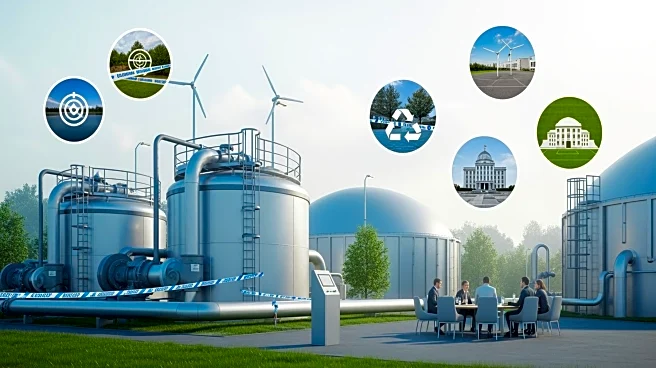What's Happening?
The biogas industry is experiencing significant growth as it becomes a key player in renewable energy and waste management. Biogas is produced through the anaerobic fermentation of organic matter, such
as agricultural residues, animal waste, and food waste, resulting in a mixture of methane and carbon dioxide. This renewable energy source is gaining traction due to its versatility in feedstock and its ability to support a circular economy by converting waste into energy and organic fertilizer. The global biogas market, valued at USD 74.37 billion in 2024, is projected to reach USD 106.03 billion by 2033, driven by environmental, economic, and policy motivations. Recent developments include EnviTec Biogas's contract to build a biogas upgrading plant in Belgium and TotalEnergies' sale of a stake in Polska Grupa Biogazowa, highlighting the industry's expansion and investment opportunities.
Why It's Important?
The expansion of the biogas industry is crucial for several reasons. It offers a sustainable solution to waste management and energy production, reducing greenhouse gas emissions and fossil fuel dependency. As countries seek to meet net-zero ambitions, biogas provides a carbon-free alternative to traditional energy sources. The industry's growth is supported by government policies, such as subsidies and renewable energy obligations, which encourage investment in biogas facilities. Additionally, biogas plays a vital role in rural electrification and cooking in developing countries, reducing reliance on wood and fossil fuels. The industry's expansion also aligns with global efforts to address climate change and energy security, making it a significant player in the transition to renewable energy.
What's Next?
The biogas industry is poised for continued growth as technological advancements improve the efficiency and commercial viability of biogas production. The development of biogas upgrading technologies, such as purification to biomethane, expands its applications in transportation and gas grids. As more countries adopt biogas as a green waste management option, the industry is expected to see increased investment and innovation. Stakeholders, including governments, businesses, and civil society groups, are likely to support the industry's expansion through favorable policies and initiatives. The focus on circular economy processes and sustainable development goals will further drive the industry's growth and integration into global energy systems.
Beyond the Headlines
The biogas industry's growth has deeper implications for environmental sustainability and economic development. By transforming organic waste into valuable energy and nutrient-rich digestate, biogas facilities contribute to soil fertilization and sustainable agriculture. The industry's expansion also supports job creation and economic growth, particularly in rural areas where biogas plants are often located. Additionally, the industry's focus on renewable energy and waste management aligns with global efforts to combat climate change and promote sustainable development. As the industry continues to evolve, it may also influence policy decisions and public perceptions of renewable energy and waste management solutions.










